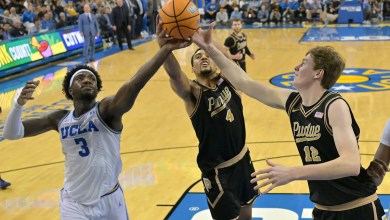‘We Will End U.S. Mischief’

Iran will “put an end to the misdeeds of the United States,” said Supreme Leader Ali Khamenei, who threatened regional war and accused President Donald Trump of inciting violent protests in an online tirade marking the anniversary of Iran’s Islamic Revolution.
Over the past 36 hours, Ayatollah Khamenei has sent an avalanche of messages to
The supreme leader invoked everything from threats of war to brutal crackdowns inside the country to try to reassert Iran’s power and claim a moral victory over what he described as Western-backed dissent.
Khamenei issued a direct threat to the United States, declaring that in the event of escalation: “This time it will be a regional war.”
He mocked US military posturing, saying: “The fact that Americans sometimes talk about war – saying we will come with warships and planes – is not new. The Iranian nation is not affected by such talk. They should not try to intimidate the Iranian nation with such things.”
He also warned of “a decisive blow” against anyone who threatens Iran.
The regime leader also pledged to remain offensive and “put an end to US misdeeds and harassment.”
Ignoring American concerns, he reduced the long-standing conflict between the United States and Iran to a simple statement: “The United States wants to devour Iran; the Iranian nation and the Islamic Republic prevent it. »
He also claimed that Washington was seeking to reclaim Iran’s oil and mineral wealth – resources it insisted The Iranian Islamic regime has “liberated” itself from American control since 1979.
“Iran has many attractions: its oil, gas, rich minerals and geographic location are attractive,” he wrote. “The United States wants to take control of this country like they controlled it before. »
Among his statements, Khamenei described recent anti-regime protests as a coup attempt orchestrated by the CIA and Mossad.
“The recent sedition was orchestrated by the Zionists and the United States,” he said, asserting that “the CIA and Mossad deployed all their resources.”
Khamenei insisted that the unrest was part of a sustained confrontation with Iran’s adversaries, saying it would continue until, in his words, “the enemy is left without hope” – a point he said the regime is certain to reach.
“The recent sedition was not the first and will not be the last,” he wrote, describing Iran as “a country in conflict with the interests of global aggressors,” before declaring that the campaign would persist “until the Iranian nation reaches a point where the enemy is desperate” – adding emphatically: “and we will reach that point.”
He further accused President Trump of fomenting the unrest by expressing support for the protesters.
Khamenei praised Iran’s internal repression – reported by some sources successful tens of thousands of casualties – crediting not only regime forces but also civilians with helping to crush what he called an engineered insurgency.
“It was the people themselves who reduced the fire of sedition to ashes,” he wrote.
Among the most provocative claims, Khamenei compared the protesters to ISIS.
“As [ISIS]seditionists in Iran burned people alive. They beheaded people! They committed the same atrocities as [ISIS] clerk,” he wrote.
He also blamed the United States for both groups, saying: “Who created [ISIS]? The current US president has explicitly stated: “We created ISIS. »
Khamenei’s remarks signal an escalation in tone, downplaying the U.S. military presence and accusing President Trump of fomenting unrest, part of a broader effort by Iran to project regional dominance and portray the United States as excessive and ineffective.
This case comes amid mass arrests in Iran campaign to crush further nationwide protests and as US intelligence assessments describe the regime’s grip on power is historically weak after last year’s strikes and internal unrest.
On Sunday, Iranian lawmakers chanted, “Death to America! Death to Israel!” while wearing the uniform of the Islamic Revolutionary Guard Corps (IRGC) during a parliamentary session.
This coordinated demonstration marked a unified public allegiance to the US-designated terrorist IRGC by Iran’s top elected officials.
Joshua Klein is a reporter for Breitbart News. Email him at jklein@breitbart.com. Follow him on Twitter @JoshuaKlein.




